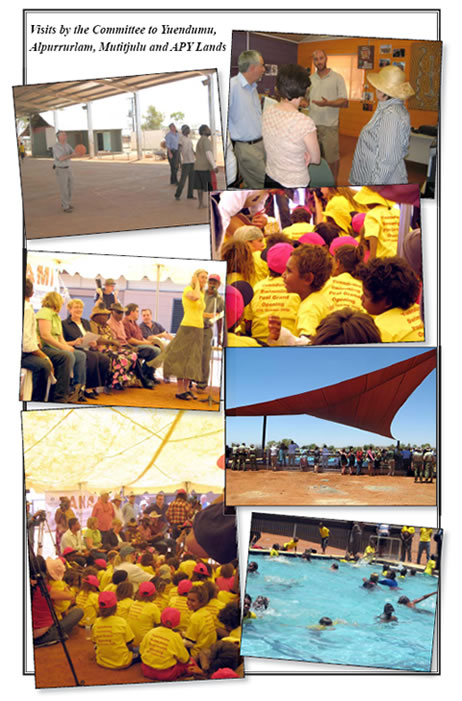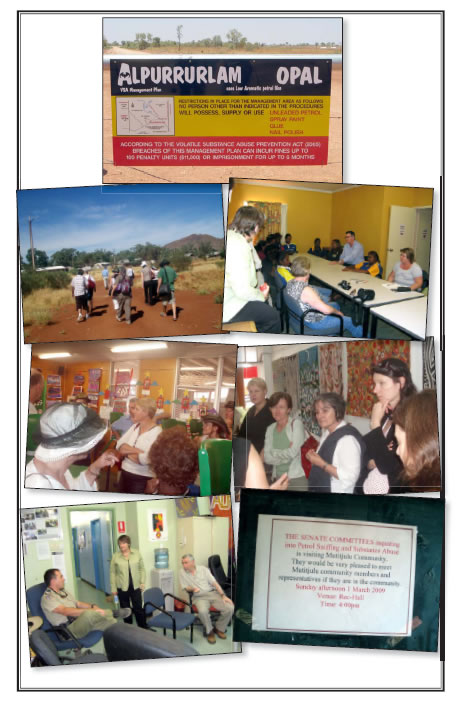Recommendations
Chapter 2
Recommendation 1
2.26 Given
that the Department of Health and Ageing provides assistance with the supply of
Opal fuel to any community that requests it, and that there was no evidence
given to the committee to indicate that communities were aware of this, the
committee recommends that the department actively promote this option in a way
that is accessible and well understood by Indigenous people and their
communities.
Recommendation 2
2.39 That
any future rollout of Opal fuel be accompanied by an appropriate communications
strategy that is implemented well in advance of the rollout. As such, the
committee urges the government as a matter of priority to finalise the revised
communications strategy before the next phase of the rollout of Opal fuel. The
committee does not consider that this should cause any delay to the further
rollout of Opal fuel.
Recommendation 3
2.57 That
Western Australia, South Australia and Queensland provide similar mechanisms
to those in place in the Northern Territory which empower individual
communities to ban the importation, supply and sale of regular petrol and other
volatile substances in a designated local council or shire area.
Chapter 3
Recommendation 4
3.26 While
the committee recognises the importance of a local 'on the ground', coordinated
presence for the effective implementation of the Eight Point Plan, it is
concerned about the Central Australian Petrol Sniffing Strategy Unit's ability
to effectively implement the Petrol Sniffing Strategy. The committee recommends
that the Commonwealth government immediately commission an independent review
of the role and function of the Central Australian Petrol Sniffing Strategy
Unit, specifically:
- its capacity
to implement the strategy effectively;
- whether its current location in the Alice
Springs Indigenous Coordination Centre as part of FaHCSIA delivers the
requisite level of accountability and governance standards;
- processes in place for the effective ongoing
monitoring, evaluation and reporting of the Unit's role;
- its ability to effectively engage and consult
with Indigenous people and communities; and
- the effectiveness of the tri-state
whole-of-government approach including the staffing and collaboration between
departments.
Recommendation 5
3.50 Given
the continuing resistance to Opal fuel by some retailers across all
jurisdictions in central Australia, the committee recommends that the
Commonwealth government complete, as a matter of priority, the necessary work
to determine whether legislation is both possible and practicable.
3.51 If
these retailers do not voluntarily agree to supply Opal within 6 months, and if
it is established that there are no legal impediments to the implementation of
Commonwealth legislation, the Commonwealth government should immediately
commence the drafting of legislation to mandate the supply of Opal fuel within
the petrol sniffing strategy zone.
Recommendation 6
3.52 In
the event that the introduction of Commonwealth legislation is not possible,
the committee recommends that state and territory governments introduce
legislation to mandate the supply of Opal within the petrol sniffing strategy
zone.
Recommendation 7
3.55 Given
that the committee in its 2006 report recommended that all governments
replicate the procedure used in Maningrida to prevent contractors bringing
regular unleaded petrol into communities by making it a term of contract, the
committee reaffirms this recommendation and recommends that contracts for
service in areas where petrol sniffing is a problem contain terms which prevent
regular unleaded fuel entering the community and require that all other
volatile substances and inhalants be locked away when not in use.
Recommendation 8
3.81 The
committee reaffirms its previous recommendation that the Commonwealth, state
and territory governments revise and agree upon priorities to consolidate and
extend the rollout of Opal fuel to utilise the current production capacity of
40 million litres per annum. The immediate focus should be on:
- delivering a
comprehensive exclusion zone in central Australia;
- the option of establishing a bulk storage
facility in Darwin in order to provide a sustainable long-term distribution
system in northern Australia; and
- actively expanding the rollout of Opal fuel to
the far west coast region of South Australia and Arnhem Land in the Northern
Territory.
Recommendation 9
3.92 The
committee considers that the 'guidelines for the responsible sale of premium
unleaded petrol' are a necessary response to the availability of sniffable premium
fuel and recommends the Commonwealth government finalise and distribute the
guidelines without delay, making sure that adequate support is provided to
ensure their implementation.
Recommendation 10
3.93 That
twelve months after the distribution of the 'guidelines for the responsible
sale of premium unleaded petrol', the Commonwealth government undertake an
audit of both the uptake and effectiveness of the guidelines in reducing access
to premium fuel for the purpose of sniffing.
3.94 Subsequently,
if the audit finds that these guidelines are not proving effective, the
committee recommends that, while conscious of the potential commercial costs,
consideration is given to subsidising the development of an Opal equivalent
substitute for premium fuel.
Recommendation 11
3.147 That
the Commonwealth government, as a matter of priority, expand current efforts to
improve data collection on the prevalence and trends over time in relation to
petrol sniffing and substance abuse in Indigenous communities so as to collect
comparable data across all jurisdictions.
Chapter 4
Recommendation 12
4.29 That
the Commonwealth government, in partnership with state and territory
governments, provide adequate resources to enable the extension of quality
youth services and the employment of a male and a female youth worker for each
community in the Petrol Sniffing Strategy Zone.
Recommendation 13
4.39 The
committee reaffirms recommendation 17 from its 2006 report which called upon
Commonwealth, state and territory governments to provide additional funding to
new and existing rehabilitation facilities in order to provide a quality
service while meeting current demand.
Recommendation 14
4.46 The
committee considers the provision of successful programs in remote Indigenous
communities to be a highly specialised area for which mainstream programs and
'one-size-fits-all' solutions are not necessarily appropriate. The committee
recommends that in order to maximise local ownership and effectiveness of
programs, the awarding of contracts in remote Indigenous communities must take
into consideration a tenderer's:
- on-the-ground
presence, reputation and standing in the region;
- existing relationships, networks within the
region and support or endorsement from communities; and
- ability to provide tailored programs to
individual communities or groups of communities in response to the diverse
cultural expectations, kinship systems and protocols of the region.
Recommendation 15
4.59 The
committee reaffirms the recommendation of its 2006 report that the
Commonwealth, state and territory governments immediately provide long term,
flexible funding, especially for successful programs already operating in
communities, to address the sporadic nature and short term focus of current
funding models.
Recommendation 16
4.60 That
governments and departments within governments, work to design application and
accountability processes which avoid duplication and reduce the number of
contracts that service providers are required to enter into and aspire to a
single contract where possible. This is to minimise the reporting and
administrative burden on service providers. The committee notes that
governments should aspire to providing a single contract where possible.
Recommendation 17
4.66 That
additional resources be provided for adult education classes in communities
where the reduction in petrol sniffing has created a need for these services,
and that appropriate adult education engagement and training methodologies are
used, delivered by qualified adult educators.
Recommendation 18
4.77 The
committee reaffirms recommendation 3 of its 2006 report that the Commonwealth
government provide adequate additional resources to the Aboriginal and Torres
Strait Islander Social Justice Commissioner to monitor and report annually on
the progress towards implementing the above mentioned recommendations until the
Commissioner can report that all recommendations have been sufficiently
addressed.


Navigation: Previous Page | Contents | Next Page